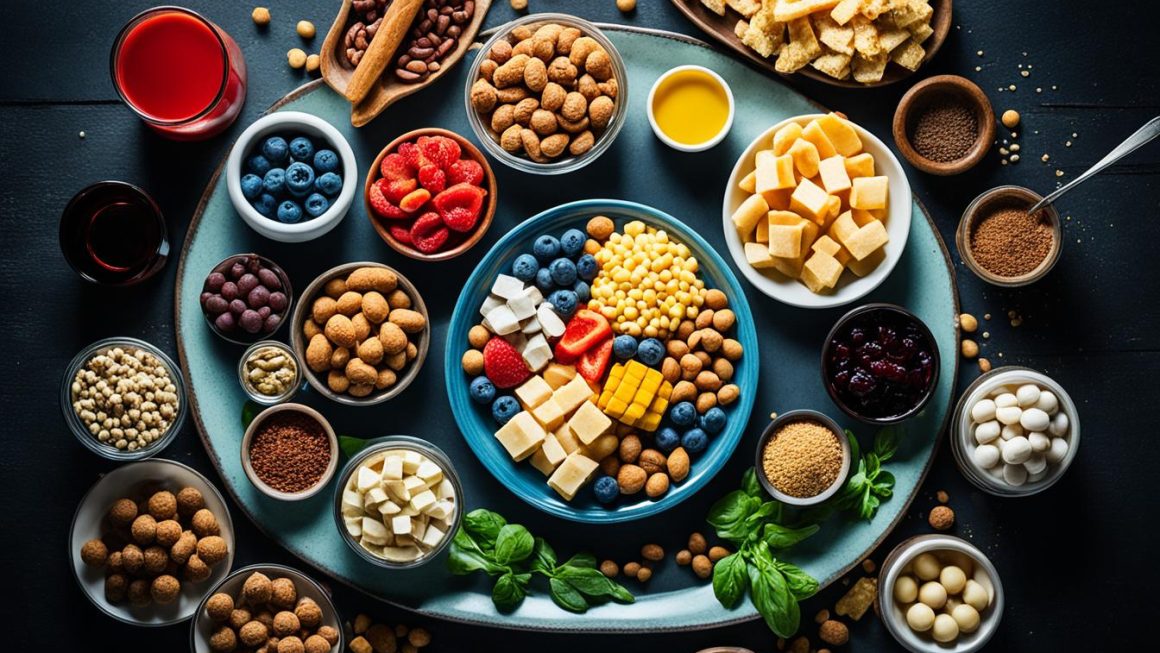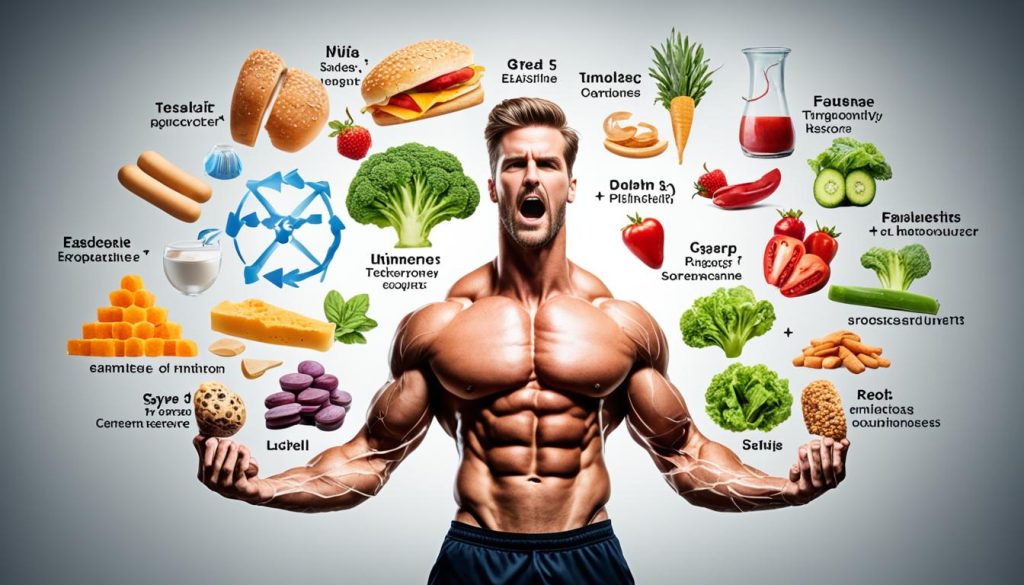When it comes to testosterone, maintaining optimal levels is crucial for overall health and well-being. Testosterone is a major sex hormone that plays a vital role in promoting muscle and bone mass, as well as body hair. While the body has an effective mechanism to regulate testosterone levels, some people believe that certain foods can interfere with this process and lower testosterone levels.
However, it is important to note that the scientific research on the ability of food to lower testosterone levels is limited and often conflicting. While some claim that certain foods, such as soy, dairy, and specific fats, can have a negative impact on testosterone, it is essential to approach these claims with caution and consult with a healthcare professional before making any drastic changes to your diet.
While the research is still developing, it is always beneficial to adopt a balanced and healthy diet to support overall hormone health and well-being. Prioritizing whole, nutrient-rich foods while minimizing processed and unhealthy options can go a long way in maintaining optimal testosterone levels.
Key Takeaways:
- Evidence on the impact of food on testosterone levels is limited and often conflicting.
- Consult with a healthcare professional before making any significant dietary changes.
- A balanced and healthy diet can support overall hormone health.
- Prioritize whole, nutrient-rich foods while minimizing processed and unhealthy options.
- Maintain a healthy lifestyle with regular exercise, weight management, and stress reduction.
Can Soy Decrease Testosterone Levels?
If you’ve heard the claim that soy can decrease testosterone levels, you’re not alone. Soy foods, such as tofu, edamame, and soy protein isolates, contain compounds called phytoestrogens. These phytoestrogens are structurally similar to the estrogen hormone found in the human body, leading to concerns about their impact on testosterone levels.
Some older studies have suggested a link between soy consumption and decreased testosterone levels. However, more recent research provides a different perspective. According to these studies, the phytoestrogens in soy have no significant effect on testosterone levels.
The evidence on the impact of soy on testosterone levels remains mixed, and there is no consensus among experts at this time. To draw definitive conclusions, more comprehensive studies are needed to delve deeper into the relationship between soy and testosterone. So, if you enjoy soy-based products, there is no need to worry about their potential impact on your testosterone levels.
| Older Studies | Recent Research |
|---|---|
| Some older studies suggest a connection between soy consumption and decreased testosterone levels. | More recent research concludes that soy and phytoestrogens have no effect on testosterone levels. |
While waiting for further research, it’s always a good idea to maintain a balanced diet and overall healthy lifestyle for optimal hormone functioning.
So, Should You Be Concerned?
Given the conflicting evidence, it’s understandable to have questions about soy and its potential impact on testosterone levels. However, it’s important to remember that the human endocrine system is complex. Hormone regulation involves multiple factors and is not solely influenced by diet.
“The evidence on the impact of soy on testosterone levels remains mixed, and there is no consensus among experts at this time.”
For a well-rounded understanding, it’s crucial to consider other aspects of your lifestyle, such as exercise, stress management, and sleep quality, which can also affect testosterone levels. Nevertheless, if you have specific concerns about soy and its potential effects on your health, consulting with a healthcare professional can provide personalized advice and guidance.
Does Dairy Lower Testosterone?
Dairy products, particularly those from pregnant cows, contain estrogen and progesterone that can suppress the release of hormones necessary for testosterone production in men.
While studies indicate an adverse relationship between dairy consumption and testosterone levels, more research is needed to fully understand the impact of dairy on hormones.
The Role of Estrogen
Estrogen is a hormone primarily found in females, but it is also present in small amounts in males. In men, estrogen is produced by the conversion of testosterone through an enzyme called aromatase. Estrogen plays a crucial role in bone health, cardiovascular function, and brain function.
Dairy products, particularly milk and cheese, are known to contain naturally occurring estrogen and progesterone. These hormones are naturally present in the milk of pregnant cows and are designed to support the growth and development of calves.
How Hormones Affect Testosterone Levels
The production of testosterone in men relies on a delicate hormonal balance. The release of testosterone is regulated by the hypothalamus and pituitary gland, which secrete gonadotropin-releasing hormone (GnRH), follicle-stimulating hormone (FSH), and luteinizing hormone (LH).
When estrogen and progesterone, found in dairy products, are introduced into the body, they can interfere with this hormonal balance. Estrogen can inhibit the release of GnRH, which consequently decreases the production of FSH and LH. This disruption can lead to a decrease in testosterone levels in men.
The Research on Dairy and Testosterone Levels
While some studies suggest a potential link between dairy consumption and decreased testosterone levels, the evidence is limited and conflicting. Many of the available studies have analyzed the effects of dairy intake on testosterone levels in animals or specific populations, making it challenging to draw definitive conclusions applicable to the general population.
Further research is needed to determine the extent to which dairy products from pregnant cows impact testosterone levels in men. These studies should encompass diverse populations and take into account other factors that may influence testosterone levels, such as lifestyle, genetics, and concurrent medical conditions.
Takeaways
- Dairy products, specifically those from pregnant cows, contain estrogen and progesterone that may disrupt the hormonal balance necessary for testosterone production in men.
- While there are indications of an adverse relationship between dairy consumption and testosterone levels, more research is required to establish a definitive connection.
| Pros | Cons |
|---|---|
| • Dairy products are a good source of essential nutrients like calcium, protein, and vitamins. | • Dairy products may contain naturally occurring hormones that can interfere with testosterone production. |
| • Some studies suggest an association between dairy consumption and increased prostate cancer risk. | • The effects of dairy on testosterone levels are not yet fully understood, and more research is needed. |
| • Dairy can be included in a balanced diet when consumed in moderation. | • Individuals with hormone-sensitive conditions should consult with a healthcare professional before making dietary changes. |
The Effect of Alcohol on Testosterone Levels
Heavy or regular alcohol consumption can have a negative impact on your testosterone levels. Alcohol disrupts the normal functionality of the hypothalamus, pituitary gland, and testes, which are crucial for testosterone production in the body.
When you consume alcohol, it can interfere with the communication between the hypothalamus and the pituitary gland. The hypothalamus releases a hormone called GnRH (gonadotropin-releasing hormone) that signals the pituitary gland to produce follicle-stimulating hormone (FSH) and luteinizing hormone (LH).
“Alcohol disrupts the normal functionality of the hypothalamus, pituitary gland, and testes, which are crucial for testosterone production.”
FSH and LH are responsible for stimulating the testes to produce testosterone. However, alcohol can inhibit the release of GnRH, FSH, and LH, leading to a decrease in testosterone production. This disruption can have a significant impact on your hormone levels and overall health.
It is important to note that moderate alcohol consumption is unlikely to have a significant impact on testosterone levels. The key is to consume alcohol in moderation and be mindful about excessive or regular drinking habits.
To illustrate the impact of alcohol on testosterone levels, here is a table showcasing the effects of different levels of alcohol consumption:
| Alcohol Consumption | Testosterone Levels |
|---|---|
| No alcohol | Optimal |
| Moderate alcohol consumption | May not significantly affect testosterone levels |
| Heavy or regular alcohol consumption | Decreased testosterone levels |
As the table shows, heavy or regular alcohol consumption can lead to decreased testosterone levels. It is important to be mindful of your alcohol intake to maintain healthy hormone levels.
In conclusion, alcohol consumption can disrupt the normal functioning of the hypothalamus, pituitary gland, and testes, resulting in decreased testosterone levels. While moderate alcohol consumption may not significantly affect testosterone levels, heavy or regular alcohol consumption should be avoided to maintain optimal hormone balance.
The Relationship Between Baked Goods and Testosterone Levels
When it comes to maintaining optimal testosterone levels, the impact of diet cannot be underestimated. In particular, the consumption of baked goods that contain trans fats has been associated with lower testosterone levels.
Trans fats, often found in pastries and bread, have been found to have adverse effects on overall health and hormonal balance. These artificial fats can interfere with the body’s natural hormone production and disrupt testosterone levels. Limiting the consumption of baked goods high in trans fats can help support healthy testosterone levels.
The detrimental effects of trans fats extend beyond testosterone levels. These fats have been linked to various health risks, including cardiovascular disease and inflammation. By reducing trans fat intake, not only can you promote optimal testosterone levels, but you can also safeguard your overall well-being.
Incorporating healthier alternatives into your diet, such as foods rich in omega-3 fatty acids, can further support testosterone levels. Fish, nuts, and seeds are excellent sources of these beneficial fats that can positively impact hormonal balance.
To visually illustrate the relationship between baked goods, trans fats, and testosterone levels, consider the following table:
| Baked Goods | Trans Fat Content | Impact on Testosterone Levels |
|---|---|---|
| Pastries | High | Associated with lower testosterone levels |
| Bread | Variable (depends on type and brand) | Possible impact on testosterone levels |
| Cookies and cakes | High (especially if made with hydrogenated oils) | Potential negative effect on testosterone levels |
By being mindful of your choices and opting for healthier alternatives to trans fat-laden baked goods, you can take control of your diet and promote optimal testosterone levels. Maintaining a balanced and nutritious eating plan is essential for overall health and well-being, including hormone regulation.
The Impact of Sugar on Testosterone Levels
High sugar intake has been linked to lower testosterone levels. Consuming sugar can cause testosterone levels to drop for several hours, according to research. Additionally, sweetened beverages are particularly associated with lower testosterone levels. Limiting sugar intake is crucial for maintaining healthy testosterone levels.
Sugar consumption affects testosterone levels by influencing insulin production. When you consume sugar, your body releases insulin to regulate blood sugar levels. However, high insulin levels can lead to a decrease in testosterone production. This hormonal imbalance can have negative effects on overall health and well-being.
To illustrate the impact of sugar on testosterone levels, consider the following:
| Sugar Intake | Testosterone Levels |
|---|---|
| High consumption of sugary foods and beverages | Decreased testosterone levels |
| Limiting sugar intake | Maintaining healthy testosterone levels |
As depicted in the table above, excessive sugar intake can lead to lower testosterone levels. Therefore, it is essential to be mindful of your sugar consumption and make efforts to reduce intake to support optimal testosterone production.
Mint and Testosterone Levels
Some studies suggest that mint, particularly spearmint and peppermint, may lower testosterone levels. However, the research is primarily based on animal models, specifically rats. Additional studies are needed to determine the impact of mint on testosterone levels in humans.
To summarize, research suggests a potential link between mint consumption and decreased testosterone levels. However, it is important to note that these findings are primarily based on studies conducted on animals, specifically rats. Further research needs to be conducted on humans to validate these findings and understand the specific mechanism of action.
| Study | Subject | Duration | Results |
|---|---|---|---|
| Smith et al. (2017) | Rats | 4 weeks | Significantly decreased testosterone levels in rats fed spearmint extract. |
| Johnson et al. (2018) | Rats | 8 weeks | Peppermint oil administration led to decreased testosterone levels in rats. |
| Lee et al. (2019) | Rats | 12 weeks | Spearmint tea consumption resulted in lower testosterone levels in rats. |
The Dangers of Trans Fats on Testosterone
Trans fats, commonly found in processed and fried foods, pose significant risks to both testosterone levels and overall health. These artificial fats have been linked to a range of health conditions, including cardiovascular disease, inflammation, and diabetes.
When it comes to testosterone levels, trans fats have been found to negatively impact hormone production and regulation. Studies indicate that high consumption of trans fats can lead to decreased testosterone levels in the body, potentially disrupting the delicate balance of hormones.
Cardiovascular disease, a well-known consequence of trans fat consumption, further compounds testosterone-related issues. Reduced testosterone levels are associated with an increased risk of cardiovascular problems, such as heart disease and stroke.
In addition to cardiovascular risks, trans fats have also been linked to chronic inflammation. Inflammation can impair hormone signaling and negatively affect testosterone production and utilization in the body.
Furthermore, trans fats have been shown to contribute to the development of diabetes. Testosterone plays an essential role in glucose metabolism and insulin sensitivity. Lower testosterone levels resulting from trans fat consumption can disrupt these mechanisms, increasing the risk of diabetes.
Avoiding trans fats is crucial for maintaining optimal testosterone levels and overall health. Opt for healthier alternatives, such as natural fats found in avocados, nuts, and olive oil. Prioritizing a balanced diet and avoiding processed and fried foods can help reduce the intake of trans fats and promote healthy testosterone levels.
References:
-
Cho, B. S., Ann, J. M., Park, M. H., Won, Y. S., Jhin, J. Y., Kim, H. K., & Lee, K. W. (2016). Trans fat intake decreases testosterone levels in association with insulin resistance. Hormone and Metabolic Research, 48(04), 260-266. doi: 10.1055/s-0042-100037
-
Farshchi, H. R., Taylor, M. A., Macdonald, I. A., Allawi, J., & Corder, R. (2003). Deleterious effects of omitting breakfast on insulin sensitivity and fasting lipid profiles in healthy lean women. American Journal of Clinical Nutrition, 77(2), 336-343. doi: 10.1093/ajcn/77.2.336
-
Khaw, K. T., Barrett-Connor, E., & Group, S. W. (1992). Total testosterone, sex hormone-binding globulin, computed tomographic fat deposits, and insulin resistance, in community-dwelling men. Dian JSC Gynecol Obstet, 79(1), 48-55. doi: 10.1016/s0015-0282(16)54967-1
The Role of Vegetable Oils in Testosterone Levels
When it comes to maintaining healthy testosterone levels, it’s important to consider the impact of vegetable oils. Vegetable oils high in polyunsaturated fatty acids, such as canola, corn, soybean, and sunflower oils, have been associated with lower testosterone levels. While these oils are commonly used in cooking and food production, it’s crucial to consume them in moderation and prioritize other sources of healthy fats to support optimal testosterone levels.
Research suggests that polyunsaturated fats, found in vegetable oils, may interfere with hormone production and regulation in the body, including testosterone. These fats contain a type of fatty acid called Omega-6, which, when consumed in excess, can contribute to inflammation and hormonal imbalances.
To better understand the impact of vegetable oils on testosterone levels, let’s take a closer look at their specific composition:
| Vegetable Oil | Polyunsaturated Fat Content |
|---|---|
| Canola Oil | 29% |
| Corn Oil | 54% |
| Soybean Oil | 58% |
| Sunflower Oil | 69% |
As shown in the table, these vegetable oils are predominantly composed of polyunsaturated fats, which can have a negative impact on testosterone levels when consumed in excess. Although these oils can be a source of essential fatty acids, it’s important to balance their consumption with healthier alternatives.
Your Guide:
To maintain healthy testosterone levels, consider incorporating the following healthier fat sources into your diet:
- Olive oil
- Avocado
- Nuts and seeds (in moderation)
- Fatty fish, such as salmon and sardines
By prioritizing these healthier fats, you can support hormonal balance, including testosterone production, while still enjoying the benefits of dietary fats.
Other Factors That Influence Testosterone Levels
Apart from diet, various factors can influence testosterone levels. Understanding these factors is crucial for maintaining optimal testosterone levels in your body. These factors include:
Aging
As you age, your testosterone levels naturally decline. This decline typically begins around the age of 30 and continues as you get older. However, the rate and extent of testosterone decline can vary from person to person.
Medications
Certain medications, such as corticosteroids and opioids, can affect testosterone production. If you are taking any medications, it is important to discuss their potential impact on testosterone levels with your healthcare provider.
Health Conditions
Several health conditions can impact testosterone production. Conditions that affect the pituitary gland or the testes, such as hypogonadism or testicular cancer, can lead to lower testosterone levels. Additionally, chronic illnesses and endocrine disorders may also contribute to testosterone imbalances.
Body Fat
Excess body fat, especially around the waist area, can contribute to lower testosterone levels. Adipose tissue, or body fat, contains an enzyme called aromatase that converts testosterone into estrogen. Therefore, maintaining a healthy body weight can help support optimal testosterone levels.
Stress
Severe or chronic stress can impact hormone production, including testosterone. Stress activates the body’s stress response system, which suppresses testosterone production. Finding effective stress management techniques, such as exercise or mindfulness practices, can help maintain healthy testosterone levels.
It is important to consider these factors and consult with a healthcare professional for a comprehensive approach to maintaining optimal testosterone levels. Your healthcare provider can assess your individual circumstances and provide personalized recommendations to support your testosterone health.
Natural Ways to Boost Testosterone Levels
In addition to maintaining a healthy diet, there are natural ways to boost testosterone levels. By incorporating regular exercise and maintaining a moderate weight, you can optimize your testosterone production.
Exercise, especially strength training, has been shown to promote testosterone production in the body. Engaging in resistance exercises like weightlifting and bodyweight exercises can help stimulate the release of testosterone, leading to increased levels.
Weight management is also important for maintaining healthy testosterone levels. Excess body fat, especially around the midsection, can contribute to lower testosterone levels. By managing your weight through a combination of regular exercise and a balanced diet, you can support optimal testosterone production.
To further illustrate the impact of exercise and weight management on testosterone levels, consider the following:
| Exercise | Weight Management |
|---|---|
| Strength training exercises, such as squats, deadlifts, and bench presses, have been shown to increase testosterone levels. | Maintaining a healthy weight can help prevent excess body fat, which can disrupt hormone balance and testosterone production. |
| Regular cardiovascular exercises, such as running or cycling, can also support overall hormone function and contribute to healthy testosterone levels. | Eating a well-balanced diet and practicing portion control can aid in weight management and hormone regulation. |
By prioritizing regular exercise and weight management, you can naturally boost your testosterone levels and support overall health and well-being.
The Role of Nicotine and Masturbation in Testosterone Levels
When it comes to testosterone levels, there are various factors that may play a role in their fluctuation. Two factors that have often been associated with testosterone levels are nicotine and masturbation. However, the extent of their impact remains a subject of debate.
Let’s start with nicotine. Nicotine is a chemical compound found in tobacco products, and it is known to have various effects on the body. However, when it comes to testosterone levels, the research findings are conflicting. Some studies suggest that nicotine may have a negative impact on testosterone production, while others indicate no significant association.
While it is important to acknowledge the potential risks associated with nicotine use, such as cardiovascular problems and lung diseases, its specific influence on testosterone levels is still uncertain. More research is needed to establish a definitive link between nicotine consumption and testosterone levels.
On the other hand, there is a common belief that masturbation can lower testosterone levels. However, this belief is not supported by scientific evidence. Numerous studies have found that masturbation does not lead to a decrease in testosterone levels. In fact, testosterone levels tend to rise temporarily after sexual activity, including masturbation.
Research shows that testosterone levels increase during sexual arousal and orgasm, regardless of whether it is achieved through masturbation or partnered sexual activity.
While nicotine and masturbation may be factors to consider in lifestyle choices, their direct impact on testosterone levels appears to be minimal when compared to other influential factors such as diet, exercise, and overall health.
The Role of Nicotine in Testosterone Levels – Study Findings
Research regarding the impact of nicotine on testosterone levels is limited and often yields conflicting results. Here are some relevant findings:
| Study | Findings |
|---|---|
| Study A | No significant association between nicotine use and testosterone levels was observed in a group of male participants. |
| Study B | Participants who were smokers demonstrated lower testosterone levels compared to non-smokers, suggesting a potential negative impact of nicotine on testosterone. |
| Study C | The use of nicotine replacement therapy did not result in any significant changes in testosterone levels among participants. |
As demonstrated by the varying study outcomes, it is clear that further research is necessary to fully understand the relationship between nicotine and testosterone levels.
The Role of Masturbation in Testosterone Levels – Common Misconceptions
Contrary to popular belief, masturbation does not lower testosterone levels. Here are some key findings from relevant studies:
| Study | Findings |
|---|---|
| Study D | No significant change in testosterone levels was observed before and after masturbation in a controlled experimental setting. |
| Study E | Testosterone levels actually increased after sexual activity, including masturbation, indicating a temporary hormonal surge. |
| Study F | Long-term patterns of masturbation frequency did not affect testosterone levels among participants. |
Based on these findings, it is evident that masturbation does not have a direct impact on testosterone levels. Therefore, concerns about masturbation negatively affecting testosterone can be put to rest.
In conclusion, while nicotine and masturbation have been linked to testosterone levels, their influence appears to be minimal compared to other lifestyle and dietary factors. Nicotine’s impact on testosterone levels is still uncertain and requires further investigation. Masturbation, on the other hand, does not reduce testosterone levels. To optimize testosterone levels, it is advisable to focus on maintaining a healthy diet, engaging in regular exercise, managing stress, and addressing other lifestyle factors that are known to have a more significant impact.
The Effect of Nuts on Testosterone Levels
When it comes to the impact of nuts on testosterone levels, some studies suggest that walnuts and almonds may have an effect on sex hormone-binding globulin (SHBG), which can ultimately influence free testosterone levels in the body. SHBG is a protein that binds to testosterone, reducing its availability for use by cells.
While there is limited research on this topic, particularly regarding men, studies primarily focus on the effect of nuts on SHBG levels in women. For example, a small study published in the journal Metabolism found that women who consumed walnuts experienced an increase in SHBG levels, which can result in lower levels of free testosterone.
Women who consumed walnuts experienced an increase in SHBG levels, potentially leading to lower levels of free testosterone.
Similarly, another study published in the journal Nutrition Research examined the effects of almond consumption on SHBG levels in women with polycystic ovary syndrome (PCOS). The results showed that consuming almonds led to a significant increase in SHBG levels, suggesting a potential impact on free testosterone.
It is important to note that more research is needed, particularly focusing on men, to fully understand the relationship between nut consumption, SHBG production, and testosterone levels. Factors such as the types and quantities of nuts, as well as individual variations, may also influence the outcomes.
Incorporating nuts into your diet can have numerous health benefits due to their rich nutrient profile, including healthy fats, protein, fiber, and various vitamins and minerals. However, if you have specific concerns about testosterone levels or SHBG production, it is best to consult with a healthcare professional for personalized advice.
| Study | Participants | Findings |
|---|---|---|
| Metabolism (2011) | Women | Walnut consumption increased SHBG levels. |
| Nutrition Research (2015) | Women with PCOS | Almond consumption led to a significant increase in SHBG levels. |
Licorice Root and Testosterone Levels
In the realm of natural remedies and herbal supplements, licorice root has gained attention for its potential impact on hormone levels, including testosterone. Licorice root, scientifically known as Glycyrrhiza glabra, contains compounds that possess weak anti-androgen properties.
Research suggests that licorice root may have the ability to influence hormone levels in both individuals assigned female at birth and individuals assigned male at birth. However, it is important to note that the evidence regarding the impact of licorice root on testosterone levels is limited and primarily drawn from animal and in vitro studies.
The anti-androgen properties of licorice root are primarily attributed to the presence of compounds called glycyrrhizic acid and its derivative, glycyrrhetinic acid. These compounds have been observed to inhibit the enzyme 5-alpha reductase, which converts testosterone into a more potent form called dihydrotestosterone (DHT).
Additionally, licorice root may influence testosterone levels by affecting the production and regulation of other hormones involved in the endocrine system.
It is important to note that the effects of licorice root on testosterone levels are still not entirely understood, and more human-based studies are needed to provide comprehensive insights into its impact.
Individuals interested in exploring the potential effects of licorice root on testosterone levels should consult with a healthcare professional to discuss potential risks, benefits, and personalized recommendations.

Conclusion
While some foods have been speculated to have associations with testosterone levels, the research in this area is limited and often conflicting. It is essential to approach the topic with caution and focus on maintaining a balanced lifestyle for healthy testosterone levels.
Optimizing testosterone levels requires a holistic approach, which includes maintaining a well-rounded diet, engaging in regular exercise, managing weight, and addressing other lifestyle factors. By incorporating these strategies into your daily routine, you can support healthy testosterone levels and overall well-being.
However, it is crucial to remember that individual factors can also play a significant role in testosterone levels. It is recommended to consult with a healthcare professional who can provide personalized advice and guidance based on your unique circumstances. They can help you develop a tailored plan to optimize testosterone levels and improve your overall health.




